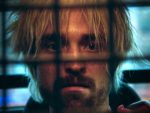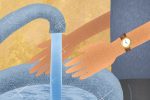Woody Harrelson is awesome, to use a technical term — and Esquire magazine agrees, as they honored Harrelson on the cover of their September issue. From his portrayal of beloved-drunk Haymitch Abernathy in “The Hunger Games” film series, to his performance as the sarcastic zombie-killer Tallahassee in the “Zombieland” franchise, Harrelson is a household name in the cinematic world.
Outside of appearing in and promoting his films, however, Harrelson rarely makes it into the media spotlight. No scandals, no arrests, no bad press — he is largely a reclusive hermit, nestled away in his Maui home. But, at some point, every hermit must venture into the world, and when they do, it is sure to be an illuminating experience.
Harrelson was briefly crowned King of Twitter Memes last month, following his comedic excursion to Wimbledon, the oldest and one of most prestigious tournaments in tennis. Sports spectators generally cannot help but to react to the on-court events — shocked eyebrow raises, disappointed groans, throwing hands in the air with disbelief. Fortunately for those people, they are not the legendary Woody Harrelson, and they don’t have a particularly bemused cameraman live-recording their every move.
Before entering the limelight of Hollywood and Twitter stardom, Harrelson was an average kid. Well, sort of. He was born in Texas in 1961 to Diane and Charles Voyde Harrelson. The family enjoyed Texan life, until Woody’s mother moved him and his siblings to Ohio, following Charles’ 1979 imprisonment.
The crime? Assassinating U.S. District Judge John Wood Jr. And this was not the first assassination Charles committed. (But it was the last.)
Woody Harrelson rarely speaks publicly of his father, who died of a heart attack in prison in 2007, but he often commends his mother for never speaking ill of Charles and providing a loving home, despite enduring such a troubling time herself.
This doesn’t mean that Woody was an angelic son though. The rambunctious, child-sized version of Harrelson got expelled from both nursery school and the first grade — which is actually rather impressive. After being falsely accused of stealing a purse, he wandered around the school in a rage, smashing out windows.
He even admits that, when he left Diane’s devout home for college, he “went straight from religion to hedonism” with little moderation.
“I was really ready to jump off into the abyss. I was just crawling to the finish line,’’ he told Esquire in 2012. “You get to this point where you realize your modes of doing things no longer fit for you. I don’t mind being Party Boy Henderson … but there just has to be an appropriate balance.”
And it is this balanced version of Woody Harrelson that the world has come to love. Harrelson emits a spirituality that is both carefree and passionate. While openly using and advocating for marijuana certainly leads one to make certain assumptions about his “free spirit,” Harrelson’s nature goes far beyond rolling a joint with his buddy Willie Nelson.
Harrelson is a self-described eco-radical, a raw vegan and an avid yogi. As this Esquire reporter discovered in 2009, asking the “True Detective” star anything could lead to an informative, albeit unexpected, soapbox session about pollution, chlorofluorocarbons, war industry or mountain-top blasting.
“It’s ironic that I’ve made so much of a living on comedy,” he told Esquire, “because I’m really one of the more depressing people you’re ever going to talk to.”
Maybe his conversational topics are heavy and a bit depressing, but the man does effuse an almost unnatural degree of happiness. His secret to a happy life? Hanging with Willie, practicing yoga, eating clean, The Beatles and not getting too stressed.
“One of the keys to happiness is being relaxed. So as relaxed as you can be is generally as happy as you are.”
Despite his personal calm and happiness, Harrelson exquisitely plays characters with deep emotional, psychological and substance abuse issues. Once such character is Rex Walls, father of Jeannette Walls, in the film adaptation of the memoir “The Glass Castle.” Rex is an alcoholic who, in moments of clarity, teaches his children that life is meant to be experienced without barriers — no rigid formal education, no binding mortgages and no dismal day jobs.
Rex has what Harrelson describes as a “zest for life,” but that admirable quality is complicated by “almost unpardonable” offenses committed while on benders.
In 2017, Harrelson portrayed Colonel J. Wesley McCullough in “War for the Planet of the Apes.” As a ruthless man with a serious God complex, the colonel wages war against both the apes and any person who threatens the purity of humanity.
The colonel’s brutality reminds audiences how Harrelson plays anti-heroes (like in “Natural Born Killers”) just as convincingly as he portrays more lovable-sarcastic types (as in “The Edge of Seventeen”).
Woody Harrelson is one of those actors who just always seems to get it right, no matter the role. But judging Harrelson off his roles would be misleading. Although most of his characters, even the most stable of them, are a bit unhinged, Harrelson is far more complex.
He is man with a tragic family history, a dedication to an earthly lifestyle and a serenely calm attitude. Despite all the newsworthy stories that one could conjure from Harrelson’s life, the media largely leaves this modern hippie to his peace.
“[Harrelson] seems like, and is, a dude who’d be great to chill with — shoot some hoops, smoke some pot, order up a burger and a beer,” writes Esquire. “Only one problem: Harrelson doesn’t eat burgers. He doesn’t do most things the way we do them.”
Harrelson might not be a traditional man, but his way of experiencing life certainly spices up the day. Case in point? He tends to walk into oncoming traffic and cross the street without looking.
One could argue that someone with such carelessness deserves to get hit. Anyone else would get hit.
But this is Woody Harrelson, and “danger can’t touch him.”
















